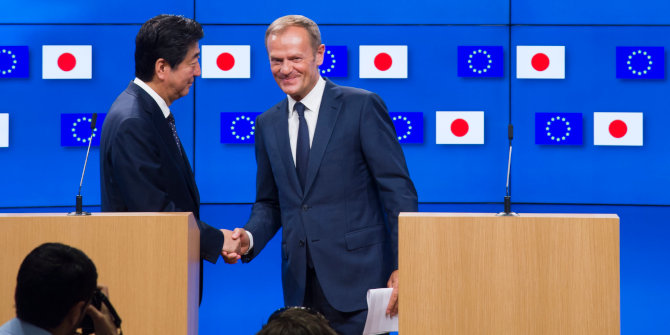 Having passed the electoral threshold and entered the Bundestag for the first time in September’s German federal election, the AfD is now coming to terms with the responsibilities and pressures of being a key player in the German parliament. One month on from the election, Julian Göpffarth reflects on three possible scenarios for the AfD over the coming years: that the party will undergo a process of nationalist radicalisation, that there will be a shift toward pragmatic centrism, and that the moderate voices within the party will become more radical in their approach.
Having passed the electoral threshold and entered the Bundestag for the first time in September’s German federal election, the AfD is now coming to terms with the responsibilities and pressures of being a key player in the German parliament. One month on from the election, Julian Göpffarth reflects on three possible scenarios for the AfD over the coming years: that the party will undergo a process of nationalist radicalisation, that there will be a shift toward pragmatic centrism, and that the moderate voices within the party will become more radical in their approach.
One month after its strong performance in the German parliamentary elections, the AfD suffered its first defeat in the Bundestag. On 24 October at a constituting plenary session, the newly elected MPs rejected the AfD’s candidate for vice-president of the parliament, Albrecht Glaser. As the strongest party, Merkel’s CDU proposed long-term Finance minister Wolfgang Schäuble for the presidency of the parliament. Along with the other parties’ candidates for vice-president, Schäuble was approved by a majority of parliamentarians. Glaser, however, was rejected in three votes – a highly unusual event in German politics.
However, the rejection of Glaser did not come as a surprise. All parties had announced their intentions to reject his candidacy in the week prior to the vote. The reason: his views on Islam. Glaser believes that Islam is not a religion, but a political ideology and that, as a consequence, it should not enjoy the freedom of religion granted by the German basic law. Yet, even in the face of a rejection by the other parties, the AfD insisted on Glaser as a candidate. AfD-leader Alexander Gauland stated that Glaser fully represents the party line. Accordingly, the party announced that it would propose Glaser once more, despite the likelihood of another rejection. It appears that the beginning of the AfD’s experience in the Bundestag looks set to be a continuation of the scandal-driven way in which the party had campaigned outside of parliament.
Even if this was only the first parliamentary session, it might give a taste of what to expect from the AfD in the four years to come. The general view is that the case of Glaser shows the party is ready to embrace dissent rather than constructive solutions. In doing so, it hopes to highlight that it is an alternative not only to the government, but to the whole of the parliament. The event has also been read as yet another sign that the radical nationalist wing is currently in the ascendancy over the more pragmatic, economically liberal wing of the AfD. But is this separation of the party into these two rough camps a realistic representation of the AfD? Will the party simply further radicalise in the future? Or will it, as some hope, be tamed by the realities of parliamentary politics? Here are three possible scenarios for the future of the party and how likely they are.
- Nationalist radicalisation
Many have read the AfD’s behaviour in the first parliamentary session as a sign that the party will stay true to its radicalism and even further radicalise to attract maximum media attention. There are some arguments for this scenario as a majority of the AfD members elected into the Bundestag exhibit the conservative and even radical nationalism that seemed to have pushed out of office the party’s first leader Bernd Lucke, and most recently Frauke Petry.
The nationalist organisations inside the party, such as Der Flügel (The Wing) or the Patriotische Plattform (Patriotic Platform) are currently strong and can be expected to strengthen their influence in the Bundestag, also because they have the support of AfD-leader Gauland. Furthermore, the radical tones coming from the leadership of the party during the election campaign and the celebrations of its election into parliament seem to indicate that the AfD is unlikely to become more moderate.
In the long term, a stronger radicalisation will most likely lead to the defection of more moderate members. The winner of such a process would arguably be former leader Frauke Petry. She left the party on the first day after the election and went on to found the party Die Blaue Wende – the blue turn. According to Petry this project is supposed to be a movement rather than a classical party that merges the structure of Macron’s En Marche with an anti-68 conservatism. Whether this proves a promising model remains to be seen. Despite having been joined by some AfD-defectors, Petry’s experiment so far seems to be suffering the same fate as Lucke’s post-AfD party project ALPHA. However, if the AfD further radicalises it is not unlikely that more members will defect and join the more moderate Petry-movement. In any case, one should keep an eye on Petry’s next moves.
- A moderate shift toward pragmatic centrism
An alternative scenario is that the party might be tamed by the realities of parliamentary life. The model for this is the Green party. According to former Green party leader and foreign minister Joschka Fischer, the Green’s march through the institutions in the 80s and 90s changed the marchers far more than the institutions. Many hope that this will also be the case for the AfD.
Inside the party, this current is represented by the Alternative Mitte (Alternative centre), which puts a strong emphasis on the strengthening of conservative and ordoliberal values within rather than against the economic and democratic principles underpinning the German political system. The group is often portrayed as the last remaining voice of the AfD’s initial form when the party emerged as an “ordoliberal alternative” to Merkel’s policies in the Greek debt crisis in 2013. Over the years, Lucke and later Petry, came to represent these principles. However, their demise reflects a continuous weakening of this approach.
- A radicalisation of the centre
Finally, there is one further scenario: a radicalisation of the moderate voices inside the party. This may be the most likely scenario, which is illustrated by current AfD leader Alice Weidel, and Jörg Meuthen, the AfD’s leading man in Baden-Württemberg. Both were initially seen as more moderate and liberal voices in the party. However, Weidel’s radical rhetoric during the election campaign as well as Meuthen’s strong links to Der Flügel clearly indicate that the general course of the party will, at least for the foreseeable future, not be one of moderation. Political scientist Cas Mudde has previously argued that what has helped the rise of radical populist right parties is their radicalisation of mainstream views. In this sense Weidel and Meuthen, as well as long-term CDU member Gauland, embody the AfD as a radicalised centre. All three come from established backgrounds and had successful careers in business, academia and politics.
In addition, as some early studies show, the AfD has been very successful in mobilising well educated and affluent voters who are at least to some extent part of the national and local elite. This indicates that what makes the AfD strong is not its radicalism and populism per se, but rather the way they radically voice views that are part of the mainstream. What provides common ground is a nationalism that is based on ordoliberal pragmatism oriented towards the defence of German economic interests, and expressed in opposition to European integration, as well as a nationalist idealism that is reflected in the search for a positive national identity, a fear of cultural decline and a rejection of Islam.
Both of these dimensions – the more assertive and even partially radical nationalism, and the more pragmatic German ordoliberalism – place their focus on “putting Germany first”. They focus not on opposing, but rather on complementing ideological currents. While one expresses a nationalist attitude that is often viewed in more widely accepted economic terms, the other does so in a cultural and often less politically correct manner. Even Petry’s defection can be interpreted in this way. She had to leave the party not because she fundamentally disagreed with its direction in terms of content, but rather in terms of strategy.
This also means that despite some links to the extreme right, the widespread fear that the AfD will turn into another threat to German democracy misses the point. The AfD leadership and many of its members know that its seemingly Janus-faced character is appealing (rather than appalling) to a large section of conservative German centrism. What’s more, despite the expectations of many that with Petry’s defection the party would split or descend into chaos, the AfD has so far shown remarkable inner coherence and a strong capacity to influence Germany’s general political discourse.
While a radicalisation of the centre could be the most likely trajectory for the AfD, the first two scenarios described above should not be discounted. But the development of the party so far has shown the AfD’s capacity to build a resilient ideological core by expressing mainstream conservative views in radical ways. To return to Fischer and the Green party, it would be accurate to state that the Greens are now more mainstream, established and pragmatic today than they were in their early years. However, it is also true that the German political mainstream has become more Green. It is not unlikely that a similar development will take place with regard to the AfD.
Please read our comments policy before commenting.
Note: This article gives the views of the author, not the position of EUROPP – European Politics and Policy or the London School of Economics. Featured image credit: Elias Schwerdtfeger (CC BY-NC-SA 2.0)
_________________________________
 Julian Göpffarth – LSE
Julian Göpffarth – LSE
Julian Göpffarth is a PhD candidate at the London School of Economics. He holds a degree in European Studies from Sciences Po Paris and the London School of Economics and Political Science. Prior to his PhD, he worked for the European Parliamentary Research Service. His research interests include nationalist ideologies, radicalisation, European politics and philosophy.




